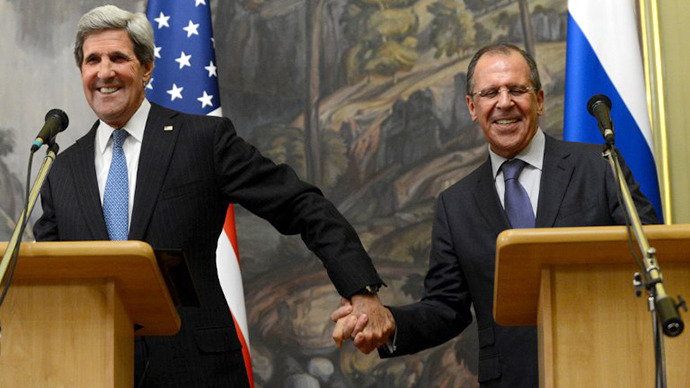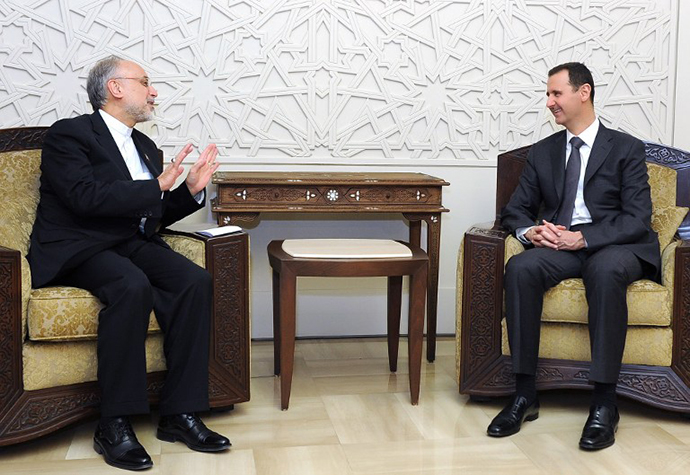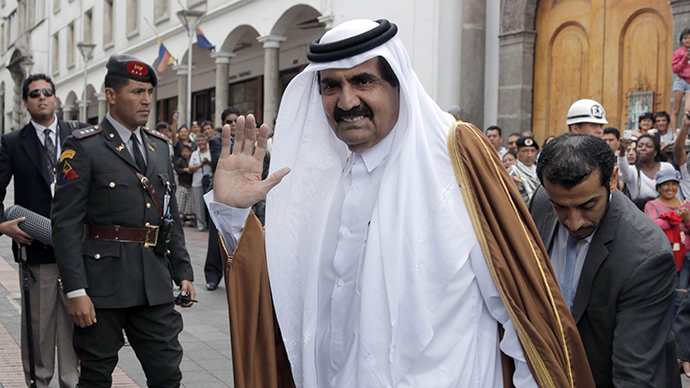Syria: A global dance of diplomacy

It’s tempting to assume Israel’s bombing of Syria may have led geopolitical players to start behaving as adults.
US Secretary of State John Kerry met Turkish Foreign Minister Ahmet Davutoglu before landing in Moscow to meet President Putin. Iranian Foreign Minister Ali Akbar Salehi was in Amman – and then forward to Damascus. British Prime Minister David ‘of Arabia’ Cameron will also meet Putin in Sochi. Next week, Qatar's Foreign Minister will be in Tehran.
What does this diplomatic dance mean? From an Obama
administration point of view, it’s still the same game: “Assad
must go,” as the President himself stressed many times, and
Moscow must give way. Wishful thinking, of course; even Kerry,
after meeting Russian Foreign Minister Sergei Lavrov, seems to have
realized which way the (desert) wind is blowing.
Here I interpreted the choices Obama had before the Israeli bombing. It’s (relatively) safe to assume that the Obama administration may have abandoned the no-fly zone option, at least for now. The notion that Obama – or Cameron, or Israel – would be able to intimidate Putin comes straight from Alice in Wonderland.
The Iranian angle
Yes, it’s always about Iran. Those plush abodes of armchair-generals – also known as US Think Tankland – are abuzz with the wishful thinking that Iran’s regional influence is declining because of the NATO-GCC-Israel-supported civil war in Syria. It’s not that simple.
On Monday, Ankara started military exercises on the Turkish-Syrian border. There’s no question Salehi and Davutoglu will be talking about this sooner rather than later.
The ultimate red line for Tehran is Assad remaining in power in Damascus. For the moment, there’s absolutely no evidence his government is collapsing.

Anyone even remotely familiar with the Middle East, especially in Tehran, knows Washington’s agenda in Syria – inbuilt in the Bush-Obama continuum. It’s all about divide and rule centered on sectarianism – as Seymour Hersh already detailed. A major plank of this strategy, of course, is the (never acknowledged) support of hardcore Islamists, once again in this case reverted to the Reaganesque status of ‘freedom fighters.’
Tehran also clearly sees how this process has led the House of Saud to be embedded with Israel – and vice-versa. In the current situation, the plum tomato in the kebab is the new Defense Crescent, leaked to Rupert Murdoch’s Sunday Times in London, linking Israel, GCC members Saudi Arabia and the UAE, Jordan and Turkey to “counter Iran’s nuclear ambitions.”
So if Iran-Syria-Hezbollah – with the Maliki government in Baghdad added for good measure – is regarded by many in the pan-Arab street as the axis of resistance, the counterattack centered in Washington, Tel Aviv and Riyadh can easily be defined as the axis of neocolonialism (axis of puppets, perhaps?)
What is Qatar up to?
US Think Tankland’s wet dreams of an Assad government collapse – or reduced to the status of a ‘non-state actor’ – obviously eschew the possibility of Salafi-jihadi outfits getting the political upper hand in Syria. If that happens, and that’s a major if, it’s clear these medieval outfits may become even more ferocious towards the GCC petromonarchies, Israel and Turkey than towards Iran.
It’s a safe bet that Salehi told the Jordanians as much during his visit. Tehran’s strategists see very clearly that in a post-Assad setting, the police state run by King Playstation – who gets away with anything in the West because he speaks perfect English – would become either another Muslim Brotherhood fiefdom or a mini-emirate.
But the really juicy relationships in all this mess are between Tehran and both Doha and Ankara. Tehran knows that nothing can be done regarding the House of Saud, whose hatred of Shia is pathological. But Tehran can certainly discuss with the Qataris and the Turks what the fallout of hardcore Sunni/Wahhabi intolerance and homicidal fury in Syria would mean for them.
Qatar will keep playing a double game. Prince Khalifa al-Thani is visiting Israel in November – a first for a Qatari royal. This is not exactly going down well among millions of committed anti-Zionists all across the Arab world.

It should not be forgotten that Qatar has always been a cheerleader of Sheikh Youssef al-Qaradawi, who after years in Doha now shines in Cairo as the head of the International Union of Muslim Scholars. Al-Qaradawi has been a great cheerleader of the jihad against Assad in Syria.
Syrian nationalist commanders (yes, they do exist) blame Qatar for remote-controlling large swathes of the ‘rebels.’ Doha’s objective: An Islamic state in Syria, what else? Not exactly an agenda endearing Doha to Washington, even though they’re apparently in bed together; the US-approved Syrian National Coalition – a Muslim Brotherhood-infested outfit – is remote-controlled by Qatar.
In Absurdistan terms, this ranks close to the House of Saud, Turkey, Jordan and Qatar covertly weaponizing the ‘rebels,’ with the CIA having a ‘consulting role’ to ensure the weapons go to secular and moderate outfits.
Qatar denies everything; a golden rule of real journalism is never to believe anything until the official denial. According to Qatari Prime Minister Hamad bin Jassim al-Thani, “We are not looking for a role just for us… We are looking for a pan-Arab role.” Qatar may be fooling Washington, but it’s certainly not fooling Damascus, Tehran or Moscow.
The statements, views and opinions expressed in this column are solely those of the author and do not necessarily represent those of RT.
The statements, views and opinions expressed in this column are solely those of the author and do not necessarily represent those of RT.













